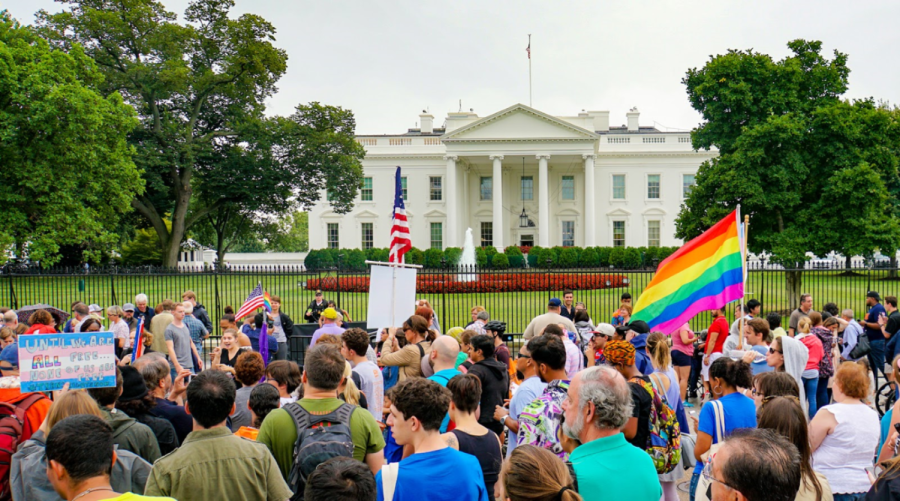The Reality of the Don’t Say Gay Bill
April 14, 2022
Over the years LGBT has generally become more accepted thanks to progressive attitudes pushed by pop culture. This includes everything from openly gay celebrities to queer representation in the television and music industries. However, discrimination on the basis of sexuality or gender identity is still happening. For example, no law prevents someone who is LGBT from being fired because of their sexuality.
Recently a bill has been passed in Florida aptly dubbed the “Don’t Say Gay” bill, or HB 1557. The bill’s preamble claims its aim is to ban discussion in the classroom concerning gender identity or sexual orientation. It continues to prohibit classroom instructors by school or third parties about either topic. This bill will affect students from kindergarten to third grade.
Clay Calvert, a specialist in freedom of speech and professor at the University of Florida, claims the expert prohibiting classroom discussion is not part of the binding and would not be effective in real life. Florida has left some leeway to “review and update its own standards about what is age appropriate,” (Calvert Copeland).
Copeland explains, “Basically all of that language is just telling us what the bill is about.”
Those who argue for the bill claim its goal is to give parents more control over their children’s education with topics some households deem as inappropriate or feel go against their “conservative values.” In fact the bill’s real name is “Parental Rights in Education” before it was dubbed the “Don’t Say Gay” bill.
Do you think LGBTQ+ discussions should be allowed in K-3rd?
Anna Dao, a Junior at Pitman High School responded:
“Yes, because it teaches kids at a young age about themselves, because being part of the LGBTQ+ community is not just about sexuality – it’s who you are. It helps prevent anxiety later when dealing with being nonheteronormative.”
Koen Knittel, a Senior at Pitman High School responded:
“Because queer people exist all around us. Like children’s friends, neighbors, or even themselves who are LGBTQ+. And they should know about it. Otherwise they’ll discover it through the internet which is a less regulated resource compared to a classroom.”
Felix Ngo, a Junior at Pitman High School responded:
“Discussion of the LGBTQ+ community and experience in a school setting is a necessity for fostering a safe environment, as exposure to experiences and perspectives different from a student’s home life allows children to be more open minded and may help ones find themselves relating to such experiences; it’s essential for processing LGBTQ acceptance and diminishing intelerance.”
Acceptance of nonheternormative romantic and sexual orientation shouldn’t be something that is treated as taboo. Children mimic and pick up the attitudes of their parents and instructors as a key part of their early development. If children learn from an early age that homosexual relationships or gender noncomforming people are not to be accepted it creates an unsafe environment for children who identify as LGBTQ+ and for children who learn to treat these individuals as other. No one should have to come out as if it is a secret to be kept, we should acknowledge that straight isn’t the baseline but part of the puzzle.
In order to get other kids opinions on the Don’t Say Gay bill, I asked a few questions to some of my classmates.
While talking with 9th grader Sophia Gomez, I asked her, “How do you feel about the Don’t Say Gay bill getting passed?”
Gomez responded with, “I think the Don’t Say Gay bill getting passed is very childish and also very unnecessary. Everyone should be able to get the opportunity to be educated on the topic. There shouldn’t be a reason not to be yourself.”
“How do you think this will affect future generations?”
She said, “I think that it’s going to affect generations by normalizing the fact that being a part of the LGBT community is ‘wrong’ and ‘not normal’ which is something I think we shouldn’t be teaching kids in the future. We shouldn’t be forcing conservative norms down kids throats just because people ‘don’t like it.’”
In another interview, I asked Freshman Vien Shiloh Santiago the same questions.
“How do you feel about the ‘Don’t Say Gay’ bill getting passed through the Florida senate?”
Santiago said, “I feel like it was something that was coming in the state of Florida right now. They’re becoming more aggressive towards their marginalized communities.”
“How do you think this will affect future generations?”
“I think future generations will find ways around this bill. Instead of silencing them, it’ll make them more outspoken,” he responded.
Growing up kids are taught to listen to and trust any adult who works within the school system, but how can a kid trust a teacher who would be forced to ‘out’ them by law? This bill strips children of their privacy, opinions, and identity all at once. Our country is supposed to be one of the most advanced and open countries in the world, and especially since it’s 2022, shouldn’t we be moving forward? These bills that keep getting passed, taking away our identities and rights, are what keeps us from advancing as people.
